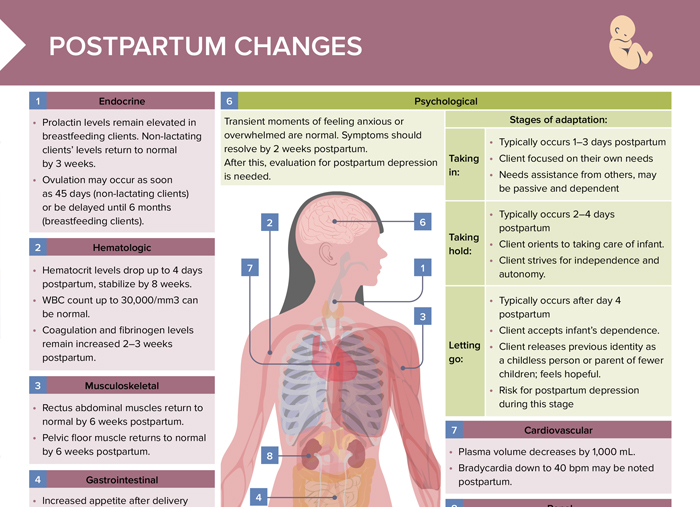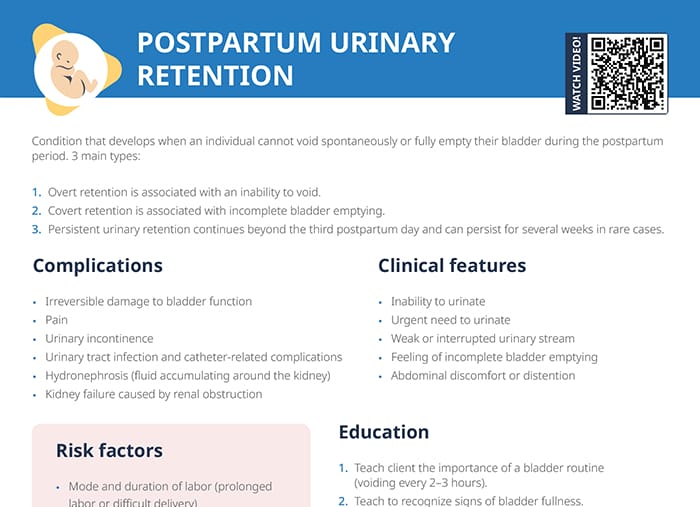What is urinary retention?
Urinary retention is defined as a condition that develops when an individual cannot spontaneously void or fully empty their bladder. Postpartum urinary retention describes urinary retention following childbirth.
Types of urinary retention
- Overt retention: inability to void
- Covert retention: incomplete bladder emptying
- Persistent retention: Postpartum urinary retention will be classified as persistent retention if it continues beyond the third postpartum day. In some cases, it can persist for several weeks.
How long does postpartum urinary retention last?
Postpartum urinary retention typically resolves within a few days. The duration can vary depending on the underlying cause and individual factors.
Related videos
What causes urinary retention?
Causes and risk factors of postpartum urinary retention
Postpartum urinary retention can be caused by effects of anesthesia, pain and trauma, or the stretching of the bladder during pregnancy and childbirth. Risk factors include:
- Mode and duration of labor (prolonged labor or difficult delivery)
- Post-void residual bladder volume
- Episiotomy/vaginal tears
- Instrumental delivery (forceps or vacuum extraction)
- Catheterization during labor
- Birth weight and multiparity
- Use of epidural anesthesia during labor
- Postpartum hemorrhage
Can constipation cause urinary retention?
A full rectum can exert pressure on the bladder and potentially cause it to not be able to completely empty. In the postpartum period, this may be an additional risk factor for urinary retention since the hormonal changes and physical effects of delivery may lead to constipation.
Urinary retention after surgery
After surgeries, urinary retention can occur due to similar reasons as postpartum urinary retention: effects of anesthesia, pain medications, limited mobility, stress/anxiety, trauma and overdistension of the bladder.
Symptoms of urinary retention
Urinary retention presents with:
- Inability to urinate
- Urgent need to urinate
- Weak or interrupted urinary stream
- Feeling of incomplete bladder emptying
- Abdominal discomfort or distention
Potential complications of urinary retention
- Irreversible damage to bladder function
- Pain
- Urinary incontinence
- UTI and catheter-related complications
- Hydronephrosis
- Kidney failure (due to renal obstruction)
Client education and interventions
- Routine:
- Clients should be encouraged to follow a bladder routine (voiding every 2–3 hours).
- Provide measures that help the routine like privacy, voiding positions, or sound of running water.
- They should drink water even if they are not feeling thirsty.
- Proper perineal hygiene should be ensured to prevent infections.
- Warning signs:
- Teach about signs of bladder fullness and bladder dysfunction.
- Make sure clients know when to seek medical assistance.
- Assessments and support:
- Ensure proper pain management.
- Perform bladder scan as needed.
- Catheterize clients if indicated and teach proper foley catheter care.
Urinary retention nursing diagnosis
Potential nursing diagnoses for urinary retention include:
- Impaired urinary elimination: monitor output, encourage and support in frequent voiding
- Acute pain: aside from ordered pain management, use of nonpharmacologic pain relief like warm compresses should be encouraged
- Anxiety: provide emotional support and education about the condition
- Risk for infection: monitor for signs of UTIs and ensure proper perineal hygiene and fluid intake

